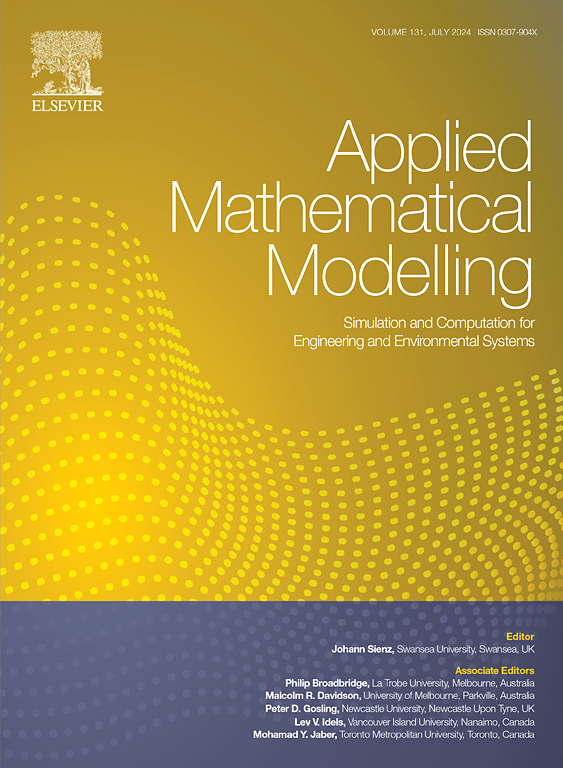Adaptive mollified prescribed performance controller for waverider vehicle subjected to mismatched disturbances
IF 4.4
2区 工程技术
Q1 ENGINEERING, MULTIDISCIPLINARY
引用次数: 0
Abstract
Considering gliding waverider vehicle is often subjected to mismatched and matched disturbances, designing a strongly robust controller to accurately limit transient performance and ensure high-precision convergence of tracking error is of great significance for flight safety. Therefore, this paper investigates an adaptive mollified prescribed performance controller for waverider vehicle, including an adaptive anti-saturation prescribed performance function, and a mollified fixed-time sliding mode surface. Firstly, a novel adaptive anti-saturation prescribed performance function is designed for waverider vehicle to exactly restrict transient and steady-state performance of attitude, and reduce saturated duration of actuator without anti-saturation compensator. Meanwhile, compared with traditional function, the performance function can adaptively adjust boundary to ensure that tracking error is always enveloped within the performance function, thus avoiding severe singularity caused by error exceeding boundary. Then, a mollified fixed-time sliding mode surface is proposed to effectively suppress mismatched disturbances acting on gliding waverider vehicle, by introducing a novel designed mollified function. The mollified function can smooth sign function, making sliding mode surface continuously differentiable to reduce chattering. Based on the novel performance function, sliding mode surface, and mollified reaching law, the adaptive mollified prescribed performance controller can accurately restrict transient and steady-state performance of waverider vehicle, reduce saturation duration of actuator, and exhibit strong robustness against mismatched and matched disturbances. Finally, numerical simulations demonstrate the effectiveness of the proposed method.
受不匹配扰动的乘波飞行器自适应软化规定性能控制器
滑翔乘波飞行器经常受到不匹配和匹配干扰,设计一种强鲁棒控制器来精确限制瞬态性能,保证跟踪误差的高精度收敛,对飞行安全具有重要意义。因此,本文研究了一种适用于乘波飞行器的自适应软化规定性能控制器,包括自适应抗饱和规定性能函数和软化定时滑模表面。首先,针对乘波飞行器设计了一种新的自适应抗饱和规定性能函数,以精确约束姿态的瞬态和稳态性能,并在不使用抗饱和补偿器的情况下缩短作动器的饱和时间;同时,与传统函数相比,性能函数可以自适应调整边界,保证跟踪误差始终被包裹在性能函数内,避免了误差超出边界造成的严重奇异性。然后,通过引入一种新的平滑函数,提出了一种平滑的定时滑模表面,有效地抑制了对滑翔乘波飞行器的不匹配干扰。平滑函数可以平滑符号函数,使滑模表面连续可微,减少抖振。基于新的性能函数、滑模曲面和柔化趋近律,自适应柔化规定性能控制器能够准确地约束乘波飞行器的瞬态和稳态性能,缩短作动器的饱和时间,对不匹配和匹配干扰具有较强的鲁棒性。最后,通过数值仿真验证了该方法的有效性。
本文章由计算机程序翻译,如有差异,请以英文原文为准。
求助全文
约1分钟内获得全文
求助全文
来源期刊

Applied Mathematical Modelling
数学-工程:综合
CiteScore
9.80
自引率
8.00%
发文量
508
审稿时长
43 days
期刊介绍:
Applied Mathematical Modelling focuses on research related to the mathematical modelling of engineering and environmental processes, manufacturing, and industrial systems. A significant emerging area of research activity involves multiphysics processes, and contributions in this area are particularly encouraged.
This influential publication covers a wide spectrum of subjects including heat transfer, fluid mechanics, CFD, and transport phenomena; solid mechanics and mechanics of metals; electromagnets and MHD; reliability modelling and system optimization; finite volume, finite element, and boundary element procedures; modelling of inventory, industrial, manufacturing and logistics systems for viable decision making; civil engineering systems and structures; mineral and energy resources; relevant software engineering issues associated with CAD and CAE; and materials and metallurgical engineering.
Applied Mathematical Modelling is primarily interested in papers developing increased insights into real-world problems through novel mathematical modelling, novel applications or a combination of these. Papers employing existing numerical techniques must demonstrate sufficient novelty in the solution of practical problems. Papers on fuzzy logic in decision-making or purely financial mathematics are normally not considered. Research on fractional differential equations, bifurcation, and numerical methods needs to include practical examples. Population dynamics must solve realistic scenarios. Papers in the area of logistics and business modelling should demonstrate meaningful managerial insight. Submissions with no real-world application will not be considered.
 求助内容:
求助内容: 应助结果提醒方式:
应助结果提醒方式:


